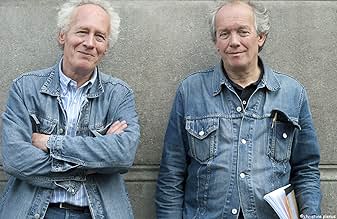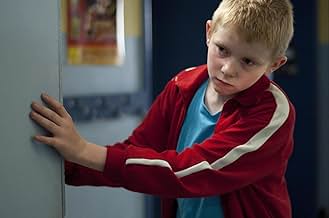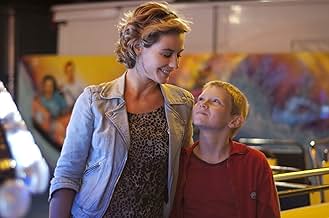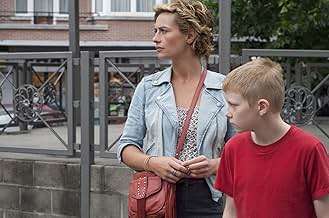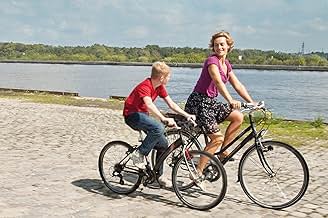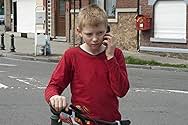PUNTUACIÓN EN IMDb
7,4/10
29 mil
TU PUNTUACIÓN
Un padre abandona a su hijo en una institución para jóvenes en una zona rural de Francia. En un acto de bondad, la peluquera local lo acoge los fines de semana.Un padre abandona a su hijo en una institución para jóvenes en una zona rural de Francia. En un acto de bondad, la peluquera local lo acoge los fines de semana.Un padre abandona a su hijo en una institución para jóvenes en una zona rural de Francia. En un acto de bondad, la peluquera local lo acoge los fines de semana.
- Dirección
- Guión
- Reparto principal
- Premios
- 9 premios y 31 nominaciones en total
Cécile de France
- Samantha
- (as Cécile De France)
Samuel De Ryck
- Éducateur 2
- (as Samuel De Rijk)
Reseñas destacadas
A beautiful film. One that pulls you in by the honest and genuine storytelling told in the Dardenne brothers' trademark naturalistic and guileless tone that is refreshing and sorely missed in today's too often rambunctious style of movies.
The story is simple and organic, the kid initially breaking out of foster care to find his father, and his bike both of which give him some identity and purpose in the world. He befriends several characters along the way (and in the Dardennes films, the characters are few, but all play vital roles) including the benevolent Samantha (whom I thought was very sweet but perhaps too pretty - and talented - to play a working- class hairdresser). Some characters are good (Samantha), some not so (Wes) and some have their own agendas to make a living.
In this way, the film is not unlike (and I quote the Dardennes) a fairytale - the boy (hero) on quest in the wide world which various characters and dangers lurking, yet set in this ultra realistic (read social-realist) setting.
The style of film-making here is pure and simple in that social-realist style, simply presenting characters who live on the fringe of society; who live in poor social economic conditions or don't have the opportunity of good schooling or the genuine love of a mother or father. As a result it is perhaps a little easier to understand why Cyril acts the way he does, rebelling against society, trying to find his place in the world. As you watch perhaps keep in mind what you might do to make ends meet.
The kid is astounding in a first-time performance, he conveys so much frustration, anger, pathos, regret with just glances and looks, most of the screen time without dialogue. Just watch the sequences when he is cycling on his bike, utterly free, chasing (or escaping) his life as the master of his own destiny.
This is a very simple & heartfelt tale, it tells the story as it is with no artifice, shot in the gorgeous dappled sunlight of a Belgian summer. It is not as hard-hitting and gritty as other of the Dardennes' films, such as emotional sledgehammers like Rosetta, Le Fils & L'Infant, but, it is still very good.
The story is simple and organic, the kid initially breaking out of foster care to find his father, and his bike both of which give him some identity and purpose in the world. He befriends several characters along the way (and in the Dardennes films, the characters are few, but all play vital roles) including the benevolent Samantha (whom I thought was very sweet but perhaps too pretty - and talented - to play a working- class hairdresser). Some characters are good (Samantha), some not so (Wes) and some have their own agendas to make a living.
In this way, the film is not unlike (and I quote the Dardennes) a fairytale - the boy (hero) on quest in the wide world which various characters and dangers lurking, yet set in this ultra realistic (read social-realist) setting.
The style of film-making here is pure and simple in that social-realist style, simply presenting characters who live on the fringe of society; who live in poor social economic conditions or don't have the opportunity of good schooling or the genuine love of a mother or father. As a result it is perhaps a little easier to understand why Cyril acts the way he does, rebelling against society, trying to find his place in the world. As you watch perhaps keep in mind what you might do to make ends meet.
The kid is astounding in a first-time performance, he conveys so much frustration, anger, pathos, regret with just glances and looks, most of the screen time without dialogue. Just watch the sequences when he is cycling on his bike, utterly free, chasing (or escaping) his life as the master of his own destiny.
This is a very simple & heartfelt tale, it tells the story as it is with no artifice, shot in the gorgeous dappled sunlight of a Belgian summer. It is not as hard-hitting and gritty as other of the Dardennes' films, such as emotional sledgehammers like Rosetta, Le Fils & L'Infant, but, it is still very good.
The Kid with a Bike (2011)
A troubled boy finds an informal foster mom who tries her best to keep in line. That's the story and in way that's the whole depth of the story. The details—his rebellion, his responding to love, his being suckered by a drug dealer—are expected and interesting and beautifully told. The story has a slightly polished realism to separate it from its forebear, the great classic "The Bicycle Thief," and there might be a slight gap in motivations to explain, but in general you get sucked into this situation and the awkward relationship between the two. It is a tale appreciated in its siimple telling.
I had a foster child for a couple of years at an age close to this boy's, and there is a lot here that makes vivid sense. The woman, perhaps too lovely for normal realism (played by Cecile De France), is nevertheless sincere and quite smart in her mothering skills. She gets the boy to live with her almost by chance, and follows that chance, and learns to give him some rope and to also reign him in by example and through compassion.
But even this isn't enough. That's one of the terrifying truths of being a foster parent (or any parent)—you can only do your best. Some of the result is a product of luck, or personality, or some course of outside events that you don't predict (even if later you can say you saw them coming). All of this is included here, well done, with a kind of filmic modesty.
The one bit of high drama comes down to the child pushing his limits when he gets into a criminal plan, and the results of that, which leads to a bit of small time revenge that goes wrong. The boy is now beyond his own limits and is literally stunned. By the last scene, you ought to be heartbroken but also really hopeful. The message finally is that kids are really resilient, and you have to keep opening the right doors for them and let them make good choices.
This film lets us do that.
A troubled boy finds an informal foster mom who tries her best to keep in line. That's the story and in way that's the whole depth of the story. The details—his rebellion, his responding to love, his being suckered by a drug dealer—are expected and interesting and beautifully told. The story has a slightly polished realism to separate it from its forebear, the great classic "The Bicycle Thief," and there might be a slight gap in motivations to explain, but in general you get sucked into this situation and the awkward relationship between the two. It is a tale appreciated in its siimple telling.
I had a foster child for a couple of years at an age close to this boy's, and there is a lot here that makes vivid sense. The woman, perhaps too lovely for normal realism (played by Cecile De France), is nevertheless sincere and quite smart in her mothering skills. She gets the boy to live with her almost by chance, and follows that chance, and learns to give him some rope and to also reign him in by example and through compassion.
But even this isn't enough. That's one of the terrifying truths of being a foster parent (or any parent)—you can only do your best. Some of the result is a product of luck, or personality, or some course of outside events that you don't predict (even if later you can say you saw them coming). All of this is included here, well done, with a kind of filmic modesty.
The one bit of high drama comes down to the child pushing his limits when he gets into a criminal plan, and the results of that, which leads to a bit of small time revenge that goes wrong. The boy is now beyond his own limits and is literally stunned. By the last scene, you ought to be heartbroken but also really hopeful. The message finally is that kids are really resilient, and you have to keep opening the right doors for them and let them make good choices.
This film lets us do that.
what a great movie! this is also a living proof that how great the french people could make an ordinary story become a profound masterpiece. this is a movie with almost all good ingredients put together in such seamless texture: great screenplay, great cast, great actors, great director.... what an emotional ride, so profound and so engaging. now i know why France would have so many great writers and artists. this a near perfect motion picture. the kid, his biologic irresponsible father, a loving and care hair dresser, a cunning drug dealer, the french social workers, the victimized father and son later both turned out to be not as honest and sincere as the kid. if there's any award that is specialized just for an underage young actor, the kid who played the kid in this movie should get it.
The Dardenne brothers (L'Enfant, Lorna's Silence) once again demonstrate their mastery for crafting character studies around broken souls trying to get by in France, with their newest film, The Kid With A Bike. The film opens with young Cyril Catoul (Thomas Doret), trying to break free from an orphanage to see his father, while everyone around him is trying to explain that his father has left him there. It's a heartbreaking opening, immediately giving us a taste of the magnificent performance that Doret will continue to demonstrate over the course of the film. Cyril is desperate to escape their clutches and refuses to listen to their pleas for understanding. He's a rebellious young boy, unyielding in his cause and so sure that there must be some explanation; surely his father couldn't be that cruel. Of course the audience knows the revelation he is most likely going to receive.
Soon he comes into the care of Samantha (the always great Cecile De France), a hairdresser in the town nearby who runs into him by chance, and this is where the film really starts to succeed. The relationship at the core of the film isn't with Cyril and his father (whom we do eventually meet), but instead with him and Samantha. Cyril spends his time pouting, rebelling and generally being your standard adolescent boy, while Samantha tries to become this mother never had. Cecile De France is an actress I'm always interested to watch, with her expressive face that she's put to great use in many films before this but never so well as she does here. Samantha's resilience towards Cyril's constant attempts to pull away make it clear that she must have come from a situation similar to his, and is fighting so fiercely to make sure he doesn't face the fate that she knows exists. In a town filled with troubled youths, Samantha fought her way out the other side and she wants to bring Cyril there with her. It's a very warming dynamic and the Dardennes really make you feel all of the highs and lows of it. This isn't your standard character study; you feel these characters like very few films can make you do.
One of the most sensational aspects of the picture is the performance anchoring it all from Thomas Doret. Watching Doret, I couldn't help but be reminded of the young Jean-Pierre Leaud in The 400 Blows. Cyril is a rebel in the purest form, broke down by the society he's been born into and constantly fighting back against the authority figures in his life. But unlike Leaud's Antoine Doinel, Cyril isn't looking for freedom here; he's looking for acceptance. Throughout the film Cyril is pulled in a multitude of directions, but the only one he wants to get pulled into is the arms of his father; and in the twisted harshness of life, that's the one direction that just pushes him away. Doret completely embodies this character, absent of any tick or fallacy that generally comes with a child actor. It's got to be the finest child performance put on screen in quite some time. The boy isn't some adorable little kid; he's a real person and sometimes he drives you insane, but you always end up rooting for him when it comes down to it. My heart sank in the moments with his father (played well by Dardennes regular Jeremie Renier), warmed in the few bright spots in his life and when he was in danger I almost drew blood from digging my nails into my palm due to the tension.
Along with the emotional journey that the Cyril/Samantha dynamic takes you on, the Dardennes also imbue the film with a dark fairy tale metaphor that I found added a great new layer to Cyril's story. Cyril spends the film wearing a variety of red tops, clearly representing our Riding Hood lost in the woods, and at a certain point he encounters our version of the Big Bad Wolf; a troubled youth who didn't have the luxury of a Samantha in his life. This Wolf is the counter to Samantha's mother figure and Cyril is a broken soul caught in a world where he could walk down the dark path of the drug dealers and thieves or into the light that Samantha tries to open up to him. It's a strikingly human story that keeps you on your toes and grasps your heart. I won't reveal the final path that Cyril ends up taking, but it kept me in tears for the final ten or fifteen minutes.
Soon he comes into the care of Samantha (the always great Cecile De France), a hairdresser in the town nearby who runs into him by chance, and this is where the film really starts to succeed. The relationship at the core of the film isn't with Cyril and his father (whom we do eventually meet), but instead with him and Samantha. Cyril spends his time pouting, rebelling and generally being your standard adolescent boy, while Samantha tries to become this mother never had. Cecile De France is an actress I'm always interested to watch, with her expressive face that she's put to great use in many films before this but never so well as she does here. Samantha's resilience towards Cyril's constant attempts to pull away make it clear that she must have come from a situation similar to his, and is fighting so fiercely to make sure he doesn't face the fate that she knows exists. In a town filled with troubled youths, Samantha fought her way out the other side and she wants to bring Cyril there with her. It's a very warming dynamic and the Dardennes really make you feel all of the highs and lows of it. This isn't your standard character study; you feel these characters like very few films can make you do.
One of the most sensational aspects of the picture is the performance anchoring it all from Thomas Doret. Watching Doret, I couldn't help but be reminded of the young Jean-Pierre Leaud in The 400 Blows. Cyril is a rebel in the purest form, broke down by the society he's been born into and constantly fighting back against the authority figures in his life. But unlike Leaud's Antoine Doinel, Cyril isn't looking for freedom here; he's looking for acceptance. Throughout the film Cyril is pulled in a multitude of directions, but the only one he wants to get pulled into is the arms of his father; and in the twisted harshness of life, that's the one direction that just pushes him away. Doret completely embodies this character, absent of any tick or fallacy that generally comes with a child actor. It's got to be the finest child performance put on screen in quite some time. The boy isn't some adorable little kid; he's a real person and sometimes he drives you insane, but you always end up rooting for him when it comes down to it. My heart sank in the moments with his father (played well by Dardennes regular Jeremie Renier), warmed in the few bright spots in his life and when he was in danger I almost drew blood from digging my nails into my palm due to the tension.
Along with the emotional journey that the Cyril/Samantha dynamic takes you on, the Dardennes also imbue the film with a dark fairy tale metaphor that I found added a great new layer to Cyril's story. Cyril spends the film wearing a variety of red tops, clearly representing our Riding Hood lost in the woods, and at a certain point he encounters our version of the Big Bad Wolf; a troubled youth who didn't have the luxury of a Samantha in his life. This Wolf is the counter to Samantha's mother figure and Cyril is a broken soul caught in a world where he could walk down the dark path of the drug dealers and thieves or into the light that Samantha tries to open up to him. It's a strikingly human story that keeps you on your toes and grasps your heart. I won't reveal the final path that Cyril ends up taking, but it kept me in tears for the final ten or fifteen minutes.
Greetings again from the darkness. When Guy (Jeremie Renier) states that he can't take care of his son Cyril (Thomas Douret) right now, I felt a rush of anger and disgust. Imagine if you were his 11 year old son hearing those words. Young kids should be able to count on their parents for emotional security above all else. There should be no fear of abandonment ... those are issues no child should be forced to deal with (barring a natural disaster).
The Belgium writer/director team of brothers Jean-Pierre and Luc Dardenne have a history of taking on parenthood and childhood in a head-on manner. Cyril is dumped in an orphanage by his dad, and is convinced that he is just misplaced, not abandoned. So being the fiercely determined kid he is, he re-traces his steps from coffee shops to bars to their old apartment. Cyril is convinced his dad never would have sold his treasured bicycle, no matter how desperate for money he was.
Whatever confusion and hostility that you think Cyril might experience, once he confronts his dad, the filmmakers display it in the rawest possible form. Cyril is a symbol of need, hiding behind a wall of rebellion. A chance encounter with Samantha (Cecile de France) leads to weekend visitations and the start of an awkward quasi-family life for both of them. Cyril tests Samantha and all other authority figures in every possible manner, often to the breaking point.
As a parent, it's easy to spot the vulnerabilities that a child faces before they have the maturity to handle it. We see how easily Cyril falls in with the wrong crowd and how quickly things can get really bad. Luckily for Cyril, Samantha doesn't abandon him. She answers "I don't know" to his question of why she let him stay with her. Although, the filmmakers never let us in on her deepest thoughts, we suspect she was once not all so different than Cyril, and someone stepped up for her.
This film won the Grand Jury Prize at Cannes in 2011 and it's easy to see how. It shows how difficult and messy ordinary life can be, but how often things turn out OK, though rarely perfect. Film lovers will recognize Cecile de France from her many films, including the recent Hereafter and the excellent Mesrine.
The Belgium writer/director team of brothers Jean-Pierre and Luc Dardenne have a history of taking on parenthood and childhood in a head-on manner. Cyril is dumped in an orphanage by his dad, and is convinced that he is just misplaced, not abandoned. So being the fiercely determined kid he is, he re-traces his steps from coffee shops to bars to their old apartment. Cyril is convinced his dad never would have sold his treasured bicycle, no matter how desperate for money he was.
Whatever confusion and hostility that you think Cyril might experience, once he confronts his dad, the filmmakers display it in the rawest possible form. Cyril is a symbol of need, hiding behind a wall of rebellion. A chance encounter with Samantha (Cecile de France) leads to weekend visitations and the start of an awkward quasi-family life for both of them. Cyril tests Samantha and all other authority figures in every possible manner, often to the breaking point.
As a parent, it's easy to spot the vulnerabilities that a child faces before they have the maturity to handle it. We see how easily Cyril falls in with the wrong crowd and how quickly things can get really bad. Luckily for Cyril, Samantha doesn't abandon him. She answers "I don't know" to his question of why she let him stay with her. Although, the filmmakers never let us in on her deepest thoughts, we suspect she was once not all so different than Cyril, and someone stepped up for her.
This film won the Grand Jury Prize at Cannes in 2011 and it's easy to see how. It shows how difficult and messy ordinary life can be, but how often things turn out OK, though rarely perfect. Film lovers will recognize Cecile de France from her many films, including the recent Hereafter and the excellent Mesrine.
¿Sabías que...?
- CuriosidadesFor both the moments where Cyril is running from the police and ends up in the doctor's office and the opening scene when he's using the phone and won't let go, the young actor was just instructed by the directors not to give up what the character was doing under any circumstance.
- PifiasWhen the hairdresser is leaving the orphanage after she returned Cyrill's bike the car she is driving makes the sound of Diesel engine, but in the next scene with the same car the car sounds like it has a petrol engine.
- Citas
Guy Catoul: It's too much. I can't look after him.
- ConexionesFeatured in At the Movies: Cannes Film Festival 2011 (2011)
- Banda sonoraAdagio un poco mosso
from Piano Concerto No. 5, Op. 73
written by Ludwig van Beethoven
performed by Alfred Brendel and the London Philharmonic Orchestra
conducted by Bernard Haitink
Selecciones populares
Inicia sesión para calificar y añadir a tu lista para recibir recomendaciones personalizadas
- How long is The Kid with a Bike?Con tecnología de Alexa
Detalles
- Fecha de lanzamiento
- Países de origen
- Sitios oficiales
- Idioma
- Títulos en diferentes países
- El nen de la bicicleta
- Localizaciones del rodaje
- Empresas productoras
- Ver más compañías en los créditos en IMDbPro
Taquilla
- Recaudación en Estados Unidos y Canadá
- 1.470.000 US$
- Fin de semana de estreno en EE. UU. y Canadá
- 45.933 US$
- 18 mar 2012
- Recaudación en todo el mundo
- 7.182.147 US$
- Duración1 hora 27 minutos
- Color
- Mezcla de sonido
- Relación de aspecto
- 1.85 : 1
Contribuir a esta página
Sugerir un cambio o añadir el contenido que falta

Principal laguna de datos
What is the Japanese language plot outline for El niño de la bicicleta (2011)?
Responde

